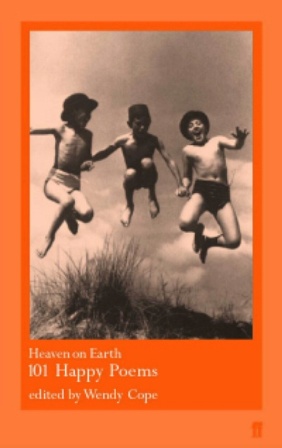Lip Verse: Heaven on Earth

The editor of this anthology, Wendy Cope, says that she compiled Heaven on Earth: 101 Happy Poems as an argument of sorts against widely held ideas that joy ‘won’t be put down on paper’ and that ‘Happiness is the one emotion a poem can’t capture’.
Certainly, as a writer, I have found that my most successful poems have arisen from experiences that upset me. Maybe because writing a good poem feels like a small way to put something right. Perhaps this is also why customers are more likely to take the time to draft a complaint when they are dissatisfied, rather than compliment when they are satisfied. Who knows what strange aspect of human psychology has caused us to be so ungrateful, but apparently “happy” poems are a rarity. And if that is true, it’s a terrible shame, because the ones in this book are fabulous.
There is a mix of both modern and traditional poems in this anthology, suggesting that the human capacity for joy is timeless, and that the things that make us happy remain essentially the same. I would have preferred to see fewer religious poems included, but I was glad to find many poems that were translations, giving the book a global feel.
It’s charming to read a variety of voices from different cultures, times and situations expressing such positivity and joy for the act of living. In fact, such happiness is rather contagious. So, allow me to share with you a few of my favourite moments from the book, in hopes of passing on a smile or two.
In the first poem in the book, Londoner, New Zealand poet Fleur Adcock, who made the UK her home, expresses her joy to be back after a trip away:
…. It’s cold, it’s foggy,
the traffic’s abominable as ever,
and there across the Thames is County Hall,
that uninspired stone body, floodlit.
It makes me laugh. In fact, it makes me sing.
Nina Cassian’s poem Intimacy, translated from Romanian, exudes a warm, serene ambiance:
There is a tacit understanding
between my pencils
and the trees outside;
between the rain
and my luminous hair.The tea is boiling:
my golden zone,
my pure burning amber.
T’ao Ch’ien’s Reading the Book of Hills and Seas has been translated from Chinese. This gentle poem explores the pastoral life and the tremendous satisfaction of being able to sit back and enjoy the harvest of one’s own labour:
In high spirits I pour out my spring wine
And pluck the lettuce growing in my garden.
A gentle rain comes stealing up from the east
And a sweet wind bears it company.
Po Chu-i’s On His Baldness is also translated from Chinese. Its cheerful protagonist finds unexpected delight in having lost his hair:
…I dreaded the time when the last lock should go…
They are all gone and I do not mind at all!
I have done with that cumbrous washing and getting dry;
My tiresome comb for ever is laid aside
In his poem, i thank You God, E. E. Cummings describes an ‘amazing/day’ that inspires a spiritual awakening:
(now the ears of my ears awake and
now the eyes of my eyes are opened)
Maura Dooley’s poem Up on the Roof, named after the popular song, is enchanting:
You wonder why it is they write of it, sing of it,
till suddenly you’re there, nearest you can get
to flying or jumping and you’re alone, at last,
the air bright.
Meanwhile, Helen Dunmore’s Privacy of rain is lush and fecund:
I love the privacy of rain,
the way it makes things happen
on verandahs, under canopies
or in the shelter of trees
as a door slams and a girl runs out
into the black-wet leaves.
I must remember to revisit Sir Edward Dyer’s My Mind to me a Kingdom Is whenever I’m feeling poor:
Some have too much, yet still do crave,
I little have, and seek no more:
They are but poor, though much they have,
And I am rich with little store:
They poor, I rich: they beg, I give;
They lack, I leave; they pine, I live.
And Richard Lovelace’s To Althea, from Prison the next time I’m claustrophobic:
Stone walls do not a prison make,
Nor iron bars a cage;
Minds innocent and quiet take
That for an hermitage;
If I have freedom in my love,
And in my soul am free;
Angels alone that soar above
Enjoy such liberty.
U. A. Fanthorpe’s exquisite poem,7301, is named for the number of days the poet calculates she has spent together with her life partner, and how many more days could be left:
I hold them crammed in my arms, colossal crops
Of shining tomorrows that may never happen,But may they! Still learning to read you,
To hear what it is you’re saying, to master the code.
And I am determined to read Elaine Feinstein’s Getting Older to the next person I hear complaining about having another birthday:
We all approach the edge of the same blackness
which for me is silent.Knowing as much sharpens
my delight in January freesia,
hot coffee, winter sunlight. So we sayas we lie close on some gentle occasion:
every day won from such
darkness is a celebration.
There is plenty to smile about in this book. But the greatest joy as a reader comes from those moments when a poem reveals the universality of human experience –reminding us that, even alone,we are always in good company. Akemi Tachibana sweetly captures this feeling in Poems of Solitary Delights:
What a delight it is
When, skimming through the pages
Of a book, I discover
A man written of there
Who is just like me.
Heaven on Earth: 101 Happy Poems is published by Faber and Faber.
Bronwyn Lovell is a poet living in Melbourne. Her poetry has been published in Antipodes, Cordite Poetry Review and theGlobal Poetry Anthology. She was shortlisted for the 2011 Montreal International Poetry Prize.

